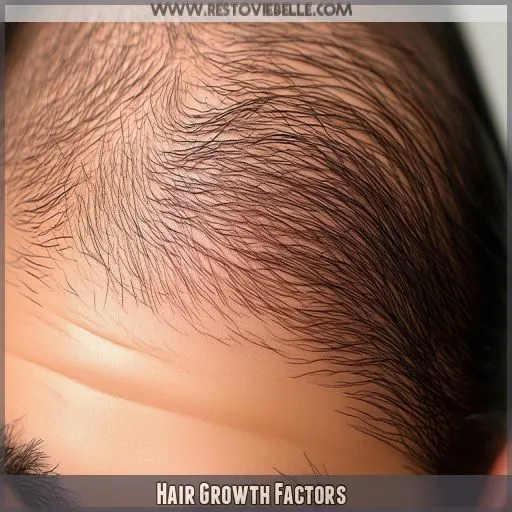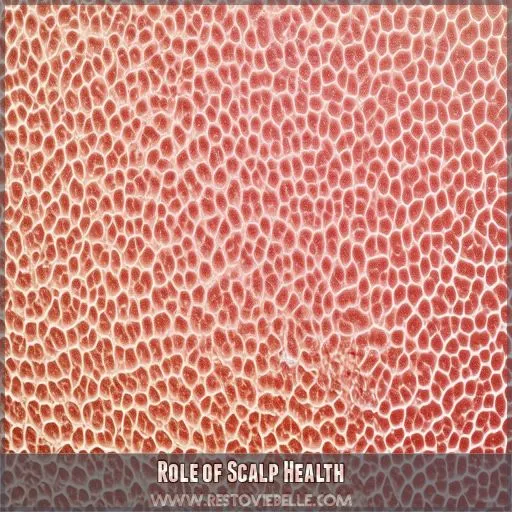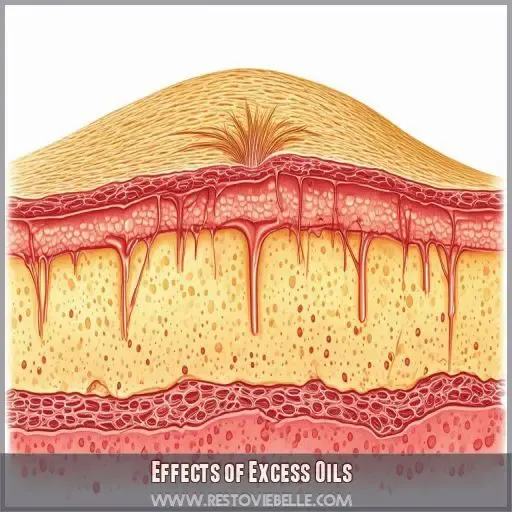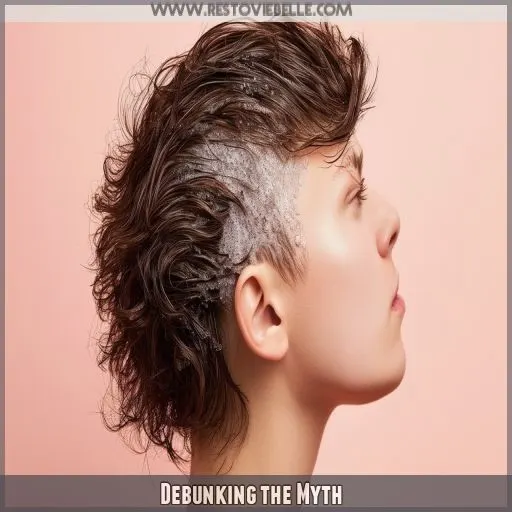This site is supported by our readers. We may earn a commission, at no cost to you, if you purchase through links.
 Curious if not washing your hair makes it grow faster? It’s a common myth.
Curious if not washing your hair makes it grow faster? It’s a common myth.
The truth behind this is that the growth of hair significantly depends on genetics, scalp health, and follicle functionality.
This theory of skipping washes to accelerate growth can often be rooted in confusion regarding natural oils and their effect.
In fact, keeping your scalp clean and healthy is vital for proper hair growth.
Let us debunk this myth by looking at the real scientific factors that influence hair growth and what excess oils and hygiene truly do.
Table Of Contents
Key Takeaways
- Washing your hair doesn’t slow down growth; it helps prevent dandruff and scalp irritation that can hinder healthy hair growth.
- While natural scalp oils are good for your hair, too much can block follicles and slow growth.
- Genetics and overall health play a bigger role in hair growth than washing frequency.
- Stress can mess with your hair growth cycle, so try to keep calm and carry on.
Does Not Washing Your Hair Make It Grow Faster?
Not washing your hair does not make it grow faster. It is dependent upon many factors, such as good scalp balance, nutrition, and genes. Natural oils protect and moisten the scalp; on the other hand, excess oil might block hair follicles and irritate or sometimes even cause breakage in them.
A clean scalp with a well-balanced microbiome goes a long way in keeping the follicles healthy for normal hair growth. Genetics play a huge role as well: hair strength and growth cycles are genetically determined.
Washing your hair regularly will ensure that the scalp remains clean and free of excess oils that hamper hair growth.
Want to learn more about how to nourish and take care of your scalp for optimum hair growth? Keep reading!
Hair Growth Factors
Hair growth is influenced by natural oils, the scalp environment, and follicle functionality. These factors work together to determine the rate and health of hair growth, but they don’t necessarily mean that washing your hair less often will make it grow faster.
Natural Oils Impact
Naturals oils, otherwise called sebum, from the scalp play important roles in hair growth. They:
- Nourish the hair follicle
- Maintain scalp microbiome balance
- Reduce scalp irritation
- Prevents hair breakage
- Regulate moisture
While sebum feeds hair health, excess sebum doubles back to block the follicles, thereby possibly hampering hair growth instead of facilitating its progressive development. Moderation is key.
Scalp Environment Influence
Your scalp pH is very important for your hair growth. When excess oil production occurs, DHT sensitivity builds up, irritating the scalp.
Keep the activity of the sebaceous gland proper to maintain moisture on the scalp.
A well-balanced microbiome on the scalp can also contribute to strengthening hair follicles and a better rate of hair growth.
These are only some of the reasons why knowing these factors will help maximize your hair growth potential.
Follicle Functionality Factors
Several factors affect follicle functionality, culminating in the potential growth of hair:
- Growth cycle: The guarantee that your hair will follow a healthy anagen phase.
- DHT sensitivity: Get a control on the hormonal levels to prevent falling hair.
- Follicle size: Maintaining large and active follicles.
- Nutrient absorption: It makes sure that the follicles receive all the required nutrients.
• Hormonal balance: Maintaining the hormones in the body for proper growth and to promote its facilitation.
Genetics and Hair Growth
Genetics play a paramount role in hair growth. Your family history greatly determines your hair’s strength, texture, and growth rate. The levels of some hormones, mainly androgens, affect the growth cycles of one’s hair to a great deal.
Nutrition also plays a key part: essential vitamins and minerals like biotin and zinc promote healthy hair. Chronic stress can cause shedding by changing the growth cycle, but regular scalp massage might improve blood circulation to the hair follicles and compensate for wearing effects.
Another factor is age: as someone gets older, hair grows more slowly, and the function of hair follicles weakens. Knowing these factors will enable you to make better decisions concerning your hair regimen.
Role of Scalp Health
Scalp health is paramount for the growth of good hair. Having a scalp microbiome—a community of microorganisms on your scalp—facilitates the retention of the right kind of balance necessary for healthy follicles.
Your natural scalp oil, or sebum, protects and moisturizes but can be fraught with problems if there’s too much or too little. This might lead to inflammation and subsequently several diseases like dandruff or scalp psoriasis.
Dandruff, characterized by flaky skin, and scalp psoriasis, characterized by red, scaly patches, may both interfere with normal hair growth by blocking up the hair follicles and causing unsuitable environments.
Regular cleaning helps to ward off these issues and maintain a clean environment for the development of hair. Therefore, cleanliness and a balanced scalp are the keys to reduced problems and steady growth of hair.
Effects of Excess Oils
Excess oils, otherwise known as sebum overproduction, can have some negative effect on your hair’s health. Too much sebum is produced if your scalp is overactive. This excess sebum causes dandruff and irritation to your scalp.
This can make for an unfavorable environment for hair follicles and ultimately bring about hair breakage. Moreover, excess sebum weighs the hair down and makes it thin by volume. Think of it as an over-oiled machine, where too much lubricant—The excess lubricant causes parts to slide around and function less in the process.
Other than this, the accumulation of too much sebum in your scalp eventually blocks the hair follicles and doesn’t let them grow healthily. A balanced environment for your scalp is required and supports stronger and more healthy hair growth.
Debunking the Myth
Not washing your hair doesn’t mean it’s going to grow any faster. In fact, washing your hair frequently helps prevent hygiene problems. Otherwise, excess oils may be responsible for the buildup of dandruff and irritation leading to problems in the scalp. All these factors lead to disturbances in the functioning of the follicles and hence impede growth. Scientifically, though, hair growth is controlled by genes and also by the state of your health—not cleanliness.
While natural oils act towards safeguarding the hair, excessively greasy hair might suffocate the follicle and hinder its growth. More frequent application of moisture is also key in ensuring a great scalp environment. A clean, balanced scalp will encourage the growth of healthy hair.
Frequently Asked Questions (FAQs)
Can stress contribute to hair growth problems?
Stress can contribute to hair growth problems, putting your follicles under siege. Scientific evidence shows stress disrupts the hair growth cycle, leading to conditions like telogen effluvium, where hair prematurely enters the shedding phase.
How do hair supplements impact growth?
Hair supplements can boost growth by providing essential nutrients like biotin, iron, and zinc. However, they’re no substitute for a balanced diet and proper hair care. Speak to your doctor before trying any supplements.
Do haircuts influence hair growth speed?
Cutting your hair doesn’t directly influence its growth speed. Hair grows from the roots, not the ends. However, regular trims prevent split ends, maintaining healthier hair, which can give the appearance of faster growth.
What role do hormones play in hair growth?
Imagine a take-off in the growth of hair in adolescents. Indeed, it’s during this period that hormones such as testosterone and estrogen have a very great impact on the hair follicles, consequently affecting the rate and pattern of hair growth. Maintain balanced hormone levels to support optimum growing hair.
Do environmental factors affect hair growth?
Environmental factors like stress, nutrition, and sun exposure can significantly impact hair growth. Maintaining a healthy lifestyle and minimizing damage are key to promoting optimal hair growth.
Conclusion
Ultimately, the belief that not washing your hair will make it grow faster is a myth. In reality, taking care of your genetics, scalp health, and follicle functionality has much more to do with benefiting your hair than not washing does.
Natural oils are essential, but cleanliness is so important in keeping the environment of the scalp healthy. By dismissing this myth, you give room to what truly assists in hair development and ensure that your regime is doing its best for scalp health.











